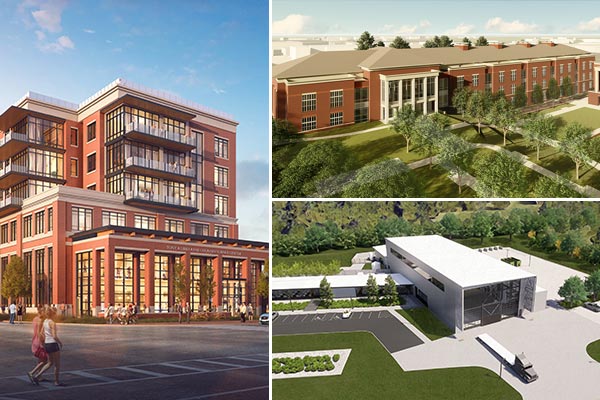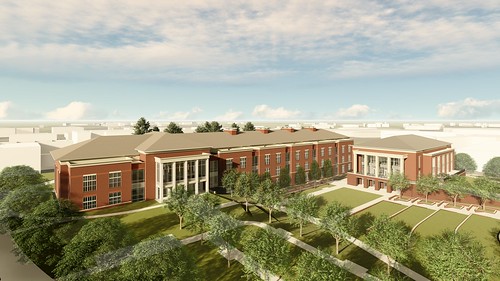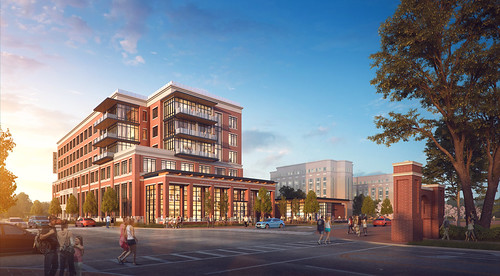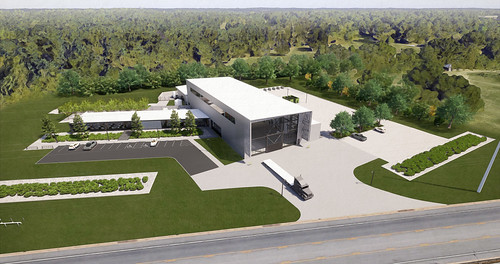Game Changers: New facilities at Auburn will take instruction, research activities to new levels
Article body
Three significant classroom and research buildings are coming to Auburn University.
The academic classroom and laboratory complex, the Tony and Libba Rane Culinary Science Center and the Advanced Structural Testing Laboratory are significant not just for their size – 334,500 square feet between them – but for the enormity of what they mean for academics at Auburn.
The university’s Board of Trustees agreed on the final plans for each construction project at its Feb. 15 meeting at Auburn University Montgomery.
The academic classroom and laboratory complex, or ACLC, will increase the existing state-of-the-art classroom and laboratory inventory that started with construction of the Mell Classroom. It will include amenities such as 20 adaptable academic spaces that can operate as either a classroom or a laboratory. The 151,000 square-foot facility, and a new central dining hall, will be located where Parker Hall and Allison Laboratory currently stand. The ACLC is scheduled for completion in the summer of 2021.
Construction of an 800-seat central dining hall will begin this spring following demolition of Allison. The three-story facility will include six food stations, two commercial dining venues and four flexible spaces where faculty and staff can meet with students. It is scheduled for completion in the fall of 2020.
The Tony and Libba Rane Culinary Science Center will provide students interested in hospitality and culinary sciences with hands-on learning experiences in a teaching hotel and a teaching restaurant, as well as a range of classrooms and demonstration and food production laboratories. Construction of 142,000-square-foot facility at the corner of South College Street and East Thach Avenue will begin after a groundbreaking ceremony in April and will be complete in 2021.
The Advanced Structural Testing Laboratory will be a 41,500-square-foot facility, boosting a high bay laboratory with specially engineered floors and walls capable of handling extreme structural testing loads; a geotechnical test chamber; a concrete materials research and testing laboratory; a wind testing facility and faculty and graduate student spaces.
In other matters, the board decided to:
- Initiate a multi-year plan to construct new surface parking areas on campus and select LBYD Engineers of Birmingham as the project engineer. The first phase would increase surface lot parking spaces by the start of the 2019-20 academic year.
- Renovate and refurbish parts of the Village Dining facility before the 2019-20 academic year and select Stacy Norman Architects of Auburn as the project architect.
- Select Stacy Norman Architects of Auburn as the architect for the College of Education building project.
- Initiate a project to improve the infrastructure of the Auburn Research Park to support the construction of the East Alabama Medical Center health science facility and future expansion of the park. Goodwyn Mills Cawood of Montgomery was selected as the project architect.
- Approve a $5.4 million project to extend campus utilities across South College Street in support of university facilities on the east side of the street. It will also relocate and modify storm water and sanitary sewers along Thach Avenue. Work will begin this summer.
- Create a Bachelor of Social Work degree program at Auburn University Montgomery.
- Set the following dates for board meetings in 2019-20: Sept. 13; Nov. 22; Feb. 14, 2020; April 17, 2020 and June 5, 2020.
Related Media
Media interested in this story can contact Communications Director Preston Sparks at (334) 844-9999 or preston.sparks@auburn.edu.
Auburn University is a nationally ranked land grant institution recognized for its commitment to world-class scholarship, interdisciplinary research with an elite, top-tier Carnegie R1 classification, life-changing outreach with Carnegie’s Community Engagement designation and an undergraduate education experience second to none. Auburn is home to more than 30,000 students, and its faculty and research partners collaborate to develop and deliver meaningful scholarship, science and technology-based advancements that meet pressing regional, national and global needs. Auburn’s commitment to active student engagement, professional success and public/private partnership drives a growing reputation for outreach and extension that delivers broad economic, health and societal impact.








